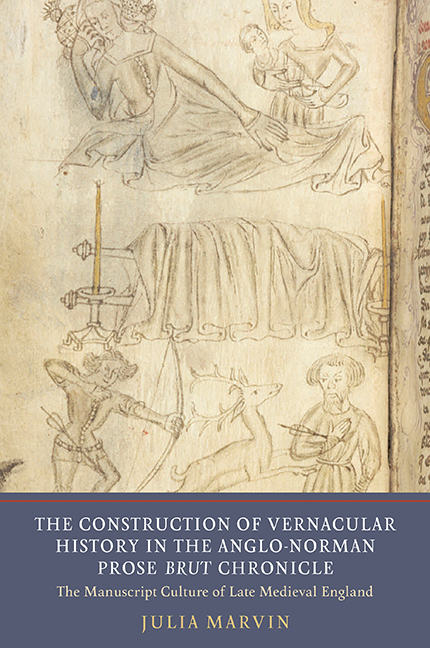 The Construction of Vernacular History in the Anglo-Norman Prose Brut Chronicle
The Construction of Vernacular History in the Anglo-Norman Prose Brut Chronicle Book contents
- Frontmatter
- Dedication
- Content
- List of Plates
- Acknowledgments
- Abbreviations
- A Note on Proper Names, Transcriptions, and Translations
- Introduction: Recognizing the Prose Brut Tradition
- Part I Construction
- 1 A New New Troy: Brut, Rome, and the Foundations of British History
- 2 The Community of the Realm: King, Baron, Brother, Stranger
- 3 Women with Voices
- 4 Social Arthur
- 5 The Continuity of the Realm
- Part II Reconstruction and Response
- Conclusion: Merlin's Power
- Bibliography
- General Index
- Index of Manuscripts Cited
5 - The Continuity of the Realm
from Part I - Construction
Published online by Cambridge University Press: 01 February 2018
- Frontmatter
- Dedication
- Content
- List of Plates
- Acknowledgments
- Abbreviations
- A Note on Proper Names, Transcriptions, and Translations
- Introduction: Recognizing the Prose Brut Tradition
- Part I Construction
- 1 A New New Troy: Brut, Rome, and the Foundations of British History
- 2 The Community of the Realm: King, Baron, Brother, Stranger
- 3 Women with Voices
- 4 Social Arthur
- 5 The Continuity of the Realm
- Part II Reconstruction and Response
- Conclusion: Merlin's Power
- Bibliography
- General Index
- Index of Manuscripts Cited
Summary
For all its modesty and pragmatism, for all its promotion of peace, prosperity, and order over combat, magnificence, and adventure, and for all its acknowledgment of the disappointments of even the greatest rulers, the Oldest Version of the Anglo-Norman prose Brut does display a larger triumphalist impulse within its survey of one king after another. The chronicle's structure unites narrative and lineage, representing them as not only coherent, but nearly synonymous: continuous story and continuous succession.
For one of the Oldest Version's main, if unstated, goals is to give its readers a sense of essentially unbroken lineage from the time of Brut straight through to that of the Plantagenets in power when the chronicle was composed. The writer faces a substantial task, given the island's long record of conquest and displacement – a record emphasized in the chronicle's sources. While manifesting awareness of the horrors and constant risk of dynastic breakdown and deploying as cautionary tales the stories of vexed succession provided by his sources, he nevertheless provides an account of British history that offers a reassuring sense of continuous heritage on a grand scale.
Over and over in the opening chapters of the prose Brut, families quarrel, the realm is divided, war results, and unity is achieved again only at great cost. Contested and broken succession leads to a generation or more of misery, while restoration achieved by a deserving and rightful heir who seeks alliance with others, or by the last-second aversion of civil war, leads to generation after generation of stability. Order is the element that linear genealogy and smooth succession provide, and from which all stand to benefit. Only when lineage and succession hold can the land remain united and sound. And order is shown as something to be cultivated, not presumed or undermined. Up to a point, the writer of the Oldest Version is working with extremely tractable materials, ones that show the full range of possibilities but always bring back the rightful line. The Roman occupation of Britain poses a greater challenge and marks a larger-scale editorial effort.
- Type
- Chapter
- Information
- The Construction of Vernacular History in the Anglo-Norman Prose Brut ChronicleThe Manuscript Culture of Late Medieval England, pp. 113 - 128Publisher: Boydell & BrewerPrint publication year: 2017
